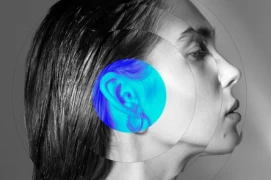
Let Your Sleep Not Be a Nightmare!: Sleep Apnea
- Let Your Sleep Not Be a Nightmare!: Sleep Apnea
- What is Sleep Apnea?
- What are the Symptoms of Sleep Apnea?
- What are the Dangers of Sleep Apnea?
- What are the Treatment Options for Sleep Apnea?
What is Sleep Apnea?
Sleep apnea is a sleep disorder characterized by repetitive pauses or reductions in breathing during sleep, leading to fragmented sleep and decreased sleep quality. Respiratory pauses typically last for more than 10 seconds and can sometimes extend to 1-2 minutes. During this time, irregular airflow due to the obstruction can affect the quality of sleep by impacting the brain and body.
The most common type of sleep apnea is called "Obstructive Sleep Apnea" (OSA), which occurs due to the blockage of the upper airways or relaxation of the muscles. The temporary closure of the airway results in a blocked airflow and lowered oxygen levels. This condition constantly disrupts the sleep of individuals with sleep apnea, leading to frequent occurrences throughout the night.
What are the Symptoms of Sleep Apnea?
- Loud snoring: One of the most noticeable signs is loud snoring, which occurs due to narrowing or obstruction of the airway.
- Breathing pauses: Individuals with sleep apnea experience breathing pauses or reductions during sleep. After these pauses, they often wake up with a gasp, disrupting the sleep cycle.
- Sleep disturbances: Breathing pauses and sleep fragmentation affect sleep quality, leading to sleep disturbances. People with sleep apnea frequently wake up during the night and feel tired and fatigued in the morning.
- Daytime sleepiness and fatigue: Due to the reduced sleep quality, individuals with sleep apnea may experience excessive daytime sleepiness, fatigue, and lack of focus, which can affect daily activities and work performance.

What are the Dangers of Sleep Apnea?
Sleep apnea is a significant sleep disorder that can lead to serious health problems and long-term complications. When left untreated or improperly managed, sleep apnea can cause several dangerous conditions. Here are the main dangers of sleep apnea:
- Heart and Vascular Diseases: Sleep apnea can lead to fluctuations in oxygen levels and blood pressure due to the repeated interruptions in breathing. This increases the risk of heart diseases. Individuals with sleep apnea have a higher risk of developing high blood pressure, cardiac arrhythmias, heart attacks, and strokes.
- Diabetes: There is a strong link between sleep apnea and diabetes. Sleep apnea can increase insulin resistance and raise the risk of type 2 diabetes.
- Obesity: Obesity is common among individuals with sleep apnea. At the same time, obesity also increases the risk of sleep apnea as it can worsen the obstruction of the airway, intensifying the severity of sleep apnea.
- Depression and Anxiety: Reduced sleep quality and chronic fatigue can lead to psychological issues such as depression and anxiety in individuals with sleep apnea.
- Daytime Sleepiness and Workplace Accidents: Sleep apnea causes excessive daytime sleepiness and lack of concentration, which can impact daily activities and lead to workplace accidents.
- Hormonal Problems: Sleep apnea can affect hormone regulation in the body. In men with sleep apnea, low testosterone levels and sexual dysfunction may be observed.
- Sleep Apnea Crises: In severe cases, individuals with sleep apnea can experience sleep apnea crises. During these crises, breathing pauses can be so frequent and prolonged that severe oxygen deprivation occurs. This is a medical emergency requiring immediate intervention.
Considering the potential dangers of sleep apnea, individuals with its symptoms should be evaluated by a healthcare professional and receive appropriate treatment. Diagnosed and treated individuals can significantly improve their health and quality of life. Treatment options may include lifestyle changes, continuous positive airway pressure (CPAP) devices, oral appliances, and surgical interventions.
What are the Treatment Options for Sleep Apnea?
The treatment options for sleep apnea can vary depending on the severity of the condition and the individual's health status. Appropriate treatment options are usually determined by a sleep specialist or an Otolaryngologist (Ear, Nose, and Throat specialist). Here are common treatment methods used to address sleep apnea:
- Lifestyle Changes: For individuals with mild sleep apnea or to alleviate symptoms, lifestyle changes may be recommended as the initial step. These changes may include:
- Weight loss: Shedding excess weight can help reduce the severity of sleep apnea symptoms.
- Reducing alcohol and sleep medication intake: Alcohol and certain sleep medications can promote airway blockage, so minimizing their consumption or avoiding them altogether may be advised.
- Changing sleep position: Sleeping on the back can increase airway blockage. Sleeping on the side or abdomen can help keep the airway more open.
- Continuous Positive Airway Pressure (CPAP) Devices: CPAP devices are one of the most effective and commonly used methods for treating sleep apnea. These devices provide a steady flow of air through a mask worn over the nose and/or mouth, keeping the airway open and preventing breathing pauses. CPAP therapy can significantly improve sleep quality for individuals with sleep apnea.
- Oral Appliances: For individuals with mild to moderate sleep apnea, oral appliances may be recommended. These appliances help keep the jaw and tongue from falling backward during sleep, thereby keeping the airway open.
- Surgical Interventions: In some cases of severe sleep apnea, surgical treatment options may be considered. Surgical procedures aim to open the upper airways and alleviate blockages.
The treatment of sleep apnea is personalized based on the individual's condition and the severity of sleep apnea. The success of the treatment depends on the reduction of sleep apnea symptoms, improvement of sleep quality, and overall health. Regular medical follow-ups and adherence to the prescribed treatment are crucial during the treatment process.






